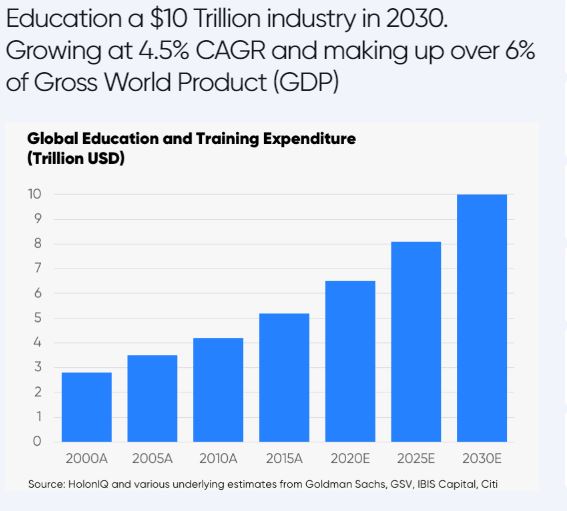Educational content marketing has emerged as a powerful strategy for reaching prospective students and parents through informative, non-promotional content.

As we approach 2025, educational institutions face a rapidly evolving landscape where trust, value, and digital engagement are more critical than ever.
Educational content marketing has emerged as a powerful strategy for reaching prospective students and parents through informative, non-promotional content.
Unlike traditional advertising, educational content marketing prioritizes creating valuable resources such as blogs, videos, webinars, and guides that address real questions, empower decision-making, and build long-term trust.
In an era where 83.6% of consumers’ report being more likely to engage with brands that offer educational content (HubSpot), institutions can significantly benefit from adopting this strategy.

As students research colleges, courses, and career paths, institutions that provide well-researched, student-focused content stand out as trusted authorities in the field. Educational content thus fosters a connection that transcends transactional engagement, aligning more closely with students’ values, interests, and career goals.
By emphasizing information over promotion, educational content marketing empowers higher education institutions to build lasting relationships with prospective students, improving both engagement and enrollment outcomes.
In 2025, this strategy will continue to help institutions navigate a competitive landscape, create impactful digital touchpoints, and meaningfully engage with a new generation of learners.
How Educational Content Benefits Both Institutions and Students
Educational content marketing presents a mutually beneficial approach that helps institutions build brand trust while offering prospective students the resources they need to make informed decisions.

For higher education institutions, the benefits are numerous: increased visibility, enhanced credibility, and improved student engagement. These benefits extend to prospective students, who gain access to content that clarifies programs, career outcomes, and the campus experience.
For institutions, educational content marketing is a proven tool for generating and nurturing high-quality leads. Data from the Content Marketing Institute reveals that 70% of marketers report more effective lead generation through content marketing compared to traditional approaches.
Additionally, as prospective students encounter valuable content, such as career guides or academic insights, they perceive the institution as a trusted authority in the field. This credibility plays a key role in the decision-making process, building a foundation of trust before a student even submits an application.
For students, educational content addresses important questions, helps identify the right program, and reduces the overwhelming nature of higher education decisions. By engaging with accessible, informative resources, students feel supported throughout the application journey.
In short, educational content helps bridge the gap between student needs and institutional offerings, creating a win-win scenario that enhances the higher education experience for everyone involved.
Key Goals of Educational Content Marketing in Higher Education
The goals of educational content marketing in higher education are diverse and impactful. They focus on building trust, increasing engagement, and generating qualified leads.
![Higher Education Marketing 2023 and Beyond [Detailed Analysis], Higher Education Marketing, Education Marketing, Education PR, Digital PR, Public Relations, Digital Marketing, social media, SEO for Higher Education, Digital Marketing for Higher Education](https://firdoshkhan.in/wp-content/uploads/2022/11/Online-Program-Higher-Education-Markrting-.jpg)
By understanding and implementing these goals, institutions can leverage educational content as a core component of their higher education marketing strategies.
1. Boost Brand Awareness: Educational content establishes an institution as an authority within its field. By consistently publishing informative content that aligns with students’ interests and goals, an institution can expand its visibility and reach. This awareness positions the institution as a reputable and credible source of information, positively impacting prospective students’ perceptions.
2. Engage and Educate Audiences: Educational content marketing aims to connect with prospective students across various digital platforms. Engaging blog posts, videos, and interactive content foster a deeper understanding of academic programs and campus culture, increasing student engagement and establishing a sense of connection.
3. Generate Quality Leads: Unlike traditional promotional content, educational content attracts students genuinely interested in learning more about the institution. These leads are often more informed and committed to the enrollment process, leading to higher conversion rates. By nurturing leads through valuable information at every stage of the student journey, educational content marketing helps institutions build a pipeline of qualified applicants who feel confident in their choice.
Types of Educational Content That Engage and Convert
To maximize the effectiveness of educational content marketing, institutions should create a mix of content formats tailored to diverse learning preferences and engagement styles.
![Higher Education Marketing 2023 and Beyond [Detailed Analysis], Higher Education Marketing, Education Marketing, Education PR, Digital PR, Public Relations, Digital Marketing, social media, SEO for Higher Education, Digital Marketing for Higher Education](https://firdoshkhan.in/wp-content/uploads/2022/11/Higher-Education-Marketing-Strategies-Post.jpg)
Here are some impactful types of educational content for higher education marketing:
- Blog Posts: Blogs allow institutions to dive into trending topics, answer common student questions, and provide program insights. Blog posts can boost SEO, bringing organic traffic from students searching for specific terms or educational advice.
- Videos: As visual content becomes increasingly popular, educational videos serve as an engaging medium to explain complex topics, offer campus tours, and share student testimonials. Platforms like YouTube, TikTok, and Instagram have made video content a staple in higher education digital marketing.
- Infographics and Data Visualizations: Infographics simplify complex data and present information in a visually engaging format. This type of content appeals to students seeking quick insights and can drive shares on social media.
- Webinars: Webinars allow prospective students to interact with faculty and alumni, ask questions, and learn about programs in real-time. They are particularly effective in the consideration stage, where students are evaluating multiple options.
- E-books and Guides: E-books provide in-depth information on specialized topics like financial aid or career planning, allowing institutions to showcase their expertise and address specific student needs. These resources are especially effective for lead capture, as students are often willing to provide contact information in exchange for valuable content.
Each format offers unique advantages, allowing institutions to engage and convert students in various stages of the decision-making journey.
Building Brand Authority: Why Education is Key
Building brand authority is essential for educational institutions aiming to stand out in a competitive landscape.

In today’s digital age, where students and parents rely on online resources to make informed decisions, establishing brand authority through education-focused content is one of the most effective strategies.
Educational content provides a platform for institutions to showcase expertise, address prospective students’ questions, and offer genuine insights that highlight their unique value.
Education-focused content like blogs, webinars, and e-books builds trust by delivering accurate, valuable information that students and parents actively seek. Unlike promotional materials, educational content connects with audiences on a deeper level, answering real questions and offering guidance without a direct sales pitch.
A survey by HubSpot found that 83% of consumers are more likely to trust brands that provide educational content, underscoring its impact on trust and credibility. Examples like Google’s free educational resources and Moz’s “Whiteboard Fridays” have demonstrated the effectiveness of this approach.
By consistently providing content that helps students make informed choices, institutions can establish themselves as trusted authorities in their fields. In a crowded marketplace, brand authority is a key differentiator that influences enrollment decisions and encourages long-term engagement.
As institutions prioritize educational content, they not only strengthen their brand reputation but also create lasting connections with their audience, ensuring students and parents see them as a credible source of valuable information.
The Customer Journey: Using Educational Content to Nurture Leads
Educational content plays a crucial role in nurturing leads throughout the customer journey, addressing the needs of prospective students at every stage from awareness to enrollment.

Here’s how educational content supports each stage:
1. Awareness Stage: At this stage, prospective students are exploring different academic paths. Content such as career guides, introductory videos, and blogs on academic trends can capture interest. This content introduces students to the institution without overwhelming them with promotional material, offering answers to initial questions.
2. Consideration Stage: In this phase, students are comparing institutions and need detailed information on programs, faculty, and campus culture. Webinars, program guides, and alumni success stories are ideal at this point, helping students evaluate options and build a clearer picture of the institution.
3. Decision Stage: At this critical stage, students are close to making a choice. Application guides, financial aid information, and detailed FAQ sections can help finalize their decision. Content that addresses common concerns such as housing, student life, and tuition builds confidence in prospective students.
In 2025, understanding the customer journey and aligning content to each stage will remain essential. By anticipating students’ questions and proactively addressing their concerns, educational content marketing creates a seamless experience that ultimately guides students to enrollment.
Best Practices for Creating Impactful Educational Content
Creating impactful educational content requires a thoughtful approach that balances informative value with engagement.

Here are some best practices to follow:
1. Know Your Audience: Start by understanding who your prospective students are and what they’re looking for. Conduct research to pinpoint their interests, concerns, and goals. Tailor content to address these, making it relevant and relatable. Insights from admissions teams or student surveys can help shape topics that resonate.
2. Maintain Consistency: Regularly publishing high-quality content keeps your audience engaged over time. Develop a content calendar to maintain consistency, planning articles, videos, or infographics around a steady schedule. A consistent presence reinforces credibility and builds a reliable resource base for students.
3. Prioritize Quality and Credibility: Content must be well-researched, accurate, and cited from reliable sources. Accuracy is crucial, as students depend on institutions for trustworthy information. Quality content should reflect your institution’s expertise, lending credibility that reinforces student confidence.
4. Utilize SEO Best Practices: Employ SEO strategies to ensure your content is easily discoverable. Conduct keyword research and incorporate terms naturally into your content. Higher education keywords like “marketing higher education” or “higher education digital marketing” help reach relevant audiences.
5. Measure and Adjust: Track performance metrics such as engagement rates, conversion rates, and website traffic. These insights help refine your approach and identify what resonates most with your audience. Regularly evaluate and update content to keep it fresh, relevant, and impactful.
Following these practices can elevate educational content, making it a vital tool for engaging students and positioning your institution as a trusted authority.
Thought Leadership and Licensed Content to Add Value
In 2025, higher education institutions can maximize their credibility and reach by incorporating thought leadership and licensed content into their educational marketing strategies.

Thought leadership content showcases an institution’s unique expertise, insights, and understanding of industry trends, allowing it to stand out as a trusted source. By sharing informed perspectives from faculty, alumni, and industry experts, institutions provide value beyond traditional program information, positioning themselves as authorities in education and career-related topics.
Licensed content enhances this value by integrating high-quality materials from reputable sources, which add a broader, credible perspective without the need to create everything in-house.
For example, partnering with established publications, such as The New York Times or Harvard Business Review, enables institutions to offer students well-researched, diverse insights that enrich their learning experience.
In fact, a study shows that 94% of audiences find content from third-party sources to be more credible, which can help build trust with prospective students and parents. AdvisorStream’s collaboration with New York Times Licensing is a prime example: the digital marketing platform increased both engagement and conversions by providing licensed, authoritative content, which distinguished it from competitors.
For higher education institutions, this approach allows them to enhance their content strategy with expert knowledge, ultimately attracting and engaging a broader audience.
As educational content marketing evolves, leveraging thought leadership and licensed content provides a dynamic way to offer genuine value to prospective students, reinforcing the institution’s reputation as an industry leader and enriching the student journey.
Measuring Success: Key Metrics for Educational Content Marketing
Evaluating the effectiveness of educational content marketing requires a focus on specific metrics that indicate engagement, reach, and conversion:

- Website Traffic: Monitoring visitor numbers and page views helps gauge interest in content.
- Engagement Metrics: Time on page, bounce rate, and pages per session reveal how compelling the content is for users.
- Conversion Rates: Lead capture forms, application clicks, and event registrations demonstrate how well content drives action.
- SEO Performance: Monitoring keyword rankings and organic traffic offers insights into the visibility and reach of educational content.
- Lead Quality: Track the quality of leads generated to assess the effectiveness of nurturing strategies.
According to the Content Marketing Institute, 77% of organizations tracking content marketing ROI see improved performance. By using analytics tools like Google Analytics and SEMrush, institutions can identify which content strategies resonate most with students and adjust future campaigns accordingly.
Future Trends in Educational Content Marketing for 2025
The educational content marketing landscape continues to evolve, with new trends emerging that shape how institutions engage with prospective students.

Here are key trends anticipated for 2025:
- Personalization Through AI: AI will enable institutions to deliver tailored content based on a student’s interests and past interactions, enhancing engagement and retention.
- Short-Form Video Content: Platforms like TikTok and Instagram Reels will popularize short-form educational videos, helping institutions reach Gen Z students on their preferred platforms.
- Interactive Experiences: Quizzes, polls, and interactive infographics provide a two-way experience, making learning enjoyable and engaging for prospective students.
- Data-Driven Decisions: Real-time analytics will guide content adjustments, allowing institutions to create highly relevant, timely materials.
- Immersive Technology: Virtual reality (VR) and augmented reality (AR) will offer immersive experiences, such as virtual campus tours, giving students a feel of campus life from anywhere in the world.
By embracing these trends, institutions can maintain a competitive edge and adapt their strategies to the digital preferences of future students.
Conclusion
In 2025, educational content marketing will continue to be a cornerstone of higher education marketing strategies, allowing institutions to build trust, engage prospective students, and position themselves as industry leaders.
By prioritizing authentic, informative content, institutions foster relationships that extend beyond enrollment, ensuring students feel valued and supported.
As digital trends evolve, institutions that embrace educational content marketing will lead the way in connecting meaningfully with students.
Are you ready to elevate your institution’s brand and engagement strategy through educational content marketing?


